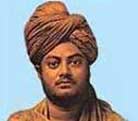 |
| a home away from home |
| HOME FEEDBACK TELL A FRIEND WEB SITE DESIGN CAREER WITH US CONTACT US |

RELIGIOUS
REFORMATION: Vivekananda
Swami
Vivekananda
(1863-1902) the chief disciple of Sri
Ramakrishna
was an embodiment of burning patriotism and robust self-confidence.
His inspiring life and message had infused a new spirit into his depressed
countrymen. The people of India at that time were very poor and illiterate
and the society was caste-ridden. The Hindu
religion specially in Bengal was in danger. He began to tour all over India to feel the pulse of the common people . He wanted to convert the Indian people into a strong nation by providing education and infusing courage into them. India was under the British rule for over one century and a half. This bondage had destroyed people's sense of pride about their culture and religion. Swamiji showed a remarkable zeal for reviving the greatness of Hinduism and Indian culture. His influence on Bengal was the most. Under the inspiration of Ramakrishna, he changed from scepticism to
religious realization and travelled all over the world, preaching the essence of the truths of Hinduism. He attended the Parliament of world religions at Chicago in America in 1893 and established the superiority of Hinduism by his superb speech. At this time one rich Irish lady became his disciple and later on she was known as Sister
Nivedita. She was asked by Swamiji to come to India to spread education here and to serve the suffering humanity. He gave a clarion call to the people to forget all caste distinctions and treat the lowliest of the lowly as part of their flesh and blood. His appeal for unity was not in vain. A sense of national unity gradually developed at that time. Swamiji founded the Ramakrishna Mission, Belur in 1897. He sought to put into practice Sri Ramakrishna's high ideal of social service through this Mission. Swami Vivekananda on the other hand, bewailed the condition of women in India, attributing the fall of the nation to its ill treatment of women. He had a certain understanding of Indian as well as Bengal traditions and believed that these traditions had much to offer to us in our present crisis. To a better future for India all these paths were related in their attempt to restore the self-respect and dignity of Indians specially of Bengal's. He was staunch anti-imperialist and worked in his own way for the freedom from the servitude to the British.
GREAT INDIANS || BENGALI SECTION || BENGALI MARRIAGE || BABY'S NAME || WALLPAPER || BENGAL || WEATHER || TRAVEL
MOBILE WALLPAPER || E-CARD || MOVIE || WEBSITE LINKS || ASSOCIATIONS || SHOPPING || ASTROLOGY || MUSIC || BEAUTY CARE
TIGER || NEWS || GUEST CORNER || FEEDBACK || LINK TO US || FOR ADVERTISING || SERVICES || CONTACT || BENGALI CALENDAR
Graphics, Sound or content copied or produced in part or whole in any media will be illegal.
Persons or websites caught using our material will be penalized.
Privacy Statement || Copyright
Copyright ©1999-2014 BANGALINET.COM